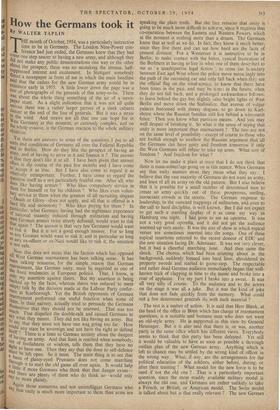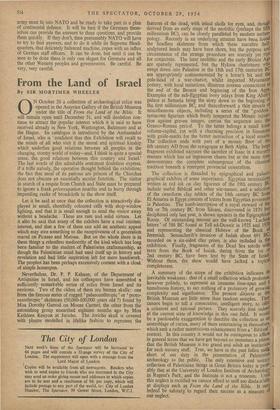How the Germans took it
HY WALTER TAPLIN THE month of October, 1954, was a particularly instructive time to be in Germany. The London Nine-Power con- ference had just ended, the Germans knew that they had come one step nearer to having a new army, and although they did not make any public demonstrations one way or the other about the prospect, there was no mistaking the intense, half- suPpressed interest and excitement. In Stuttgart somebody thrust a newspaper in front of me in which the main headline said that the cadres for the new German army would be in existence early in 1955. A little lower down the page was a row of photographs of the generals of this army-to-be. There Was about the whole thing something of the air of a news- Paper stunt. - As a slight indication that it was not all quite serious there was a rather larger picture of a sleek cabaret lancer at the end of the line of generals. But it was a straw 1,..n the wind. And straws are all that one can hope for in west Germany at this moment, so curiously complex, and on the whole evasive, is the German reaction to the whole military situation.
Yet there are answers to some of the questions I put to all sorts alid conditions of Germans all over the Federal Republic and in Berlin. How do they like the prospect of having an army, and of having to serve in it and finance it ? The answer Is that they don't like it at all. I have been given that answer often in the course of the past few months and 1 have come to accept it as true. But I have also come to regard it as relatively unimportant. Further, I have come to regard the question itself as a not particularly fruitful one. After all, who 'toes like having armies ? Who likes compulsory service in there for himself or for his children ? Who likes even volun- tary service in them when the greatest of all recruiting slogans ---Cleath or Glory—does not apply, and all that is offered is a hard life and monotony ? Who likes paying for them ? In Particular, what German. having had the nightmare experience of national insanity induced through militarism and having seen German armies twice utterly defeated, would want to risk that again ? The answer is that very few Germans would want to risk it. But it is not a good enough answer. For so long as any German would want to risk it, and in particular so long as any ex-officer or ex-Nazi would like to risk it, the situation rs not safe.
Now this does not mean that the faction which has opposed a,11 West German rearmament has been talking sense. It has been talking nonsense, for the simple reason that German rearmament, like German unity, must be regarded as one of the fixed tendencies in European politics. That, I know, is backed my assertion against theirs. But my assertion is being 'Jacked up by the facts, whereas theirs was reduced to mere ettlPty talk by the decision made at the Labour Party confer- !ace at Scarborough. Yet the British opponents of German rearmament performed one useful function when some of t filetn• in their naivety, actually tried to persuade the Germans themselves that they should not be rearmed. That was too ,..inuch• That dispelled the double-talk and caused Germans to '14t Y what they meant. They did not like having an army. But ° say that they must not have one waz going too far. How itself any state be sovereign and not have the right to defend _`.self ? There is a limit to German anxiety about the dangers of having an army. And that limit is reached when somebody, out of foolishness or wisdom, tells them that they have no sight to have one. Then they say that the door to self-defence must be left open. So it must. The main thing is to see that Zband of glassy-eyed Prussians does not come marching through more Germans who think that that danger exists— it to start the old game all over again. It would help d there are plenty of them who do think so—would only 6 Y so more plainly. Again those numerous and not unintelligent Germans who baY that unity is much more important to them than arms are speaking the plain truth. But the fact remains that unity is going to be much more difficult to achieve, since it requires that co-operation between the Eastern and Western Powers, which at the moment is nothing more than a dream. The Germans know that as well as we do. In fact, they know it much better, since they live there and can see how hard are the facts of present division. For a Westerner it is instructive to be in Berlin; to make contact with the bitter, cynical frustration of the Berliners at having to live in what one of them described to me as ' a quadripartite legal fiction % to cross tile boundary between East apd West where the police move menacingly into the path of the oncoming car and only fall back when they see the official flag on the wind-screen; to know that there have been times in the past, and may he ti.iie3 in the future, when they do not fall back, and a prolonged awkwardness follows; to leave behind the gay but slightly false bright lights of West Berlin and move down the Stalinaliee, that avenue of vulgar palaces festooned with dreary slogans: to go down to Karl- shorst where the Russian families still live behind a wire-mesh fence. Then you know what partition means. And yot) may • well despair of breaking it. So what is the sense of saying that _ unity is more important than rearmament ? The two arc not on the same level of possibility—except of course to those who are foolish enough to swallow the Russian argument that all the Germans can have unity and freedom tomorrow if only the West Germans will refuse to take up arms. What sort of freedom ? And freedom for what Now let me make it plain at once that I do not think that there is mass-subterfuge going on in this matter. When Germans say that unity matters most they mean what they say. I -believe that the vast majority of Germans do not want an army, and least of all an army on the old pattern. But I also believe that it is possible for a small number of determined men to create an army quickly out of those prosperous, smiling, insouciant crowds in the streets. The German response to leadership, to the outward trappings of militarism, and even to the call to hard discipline, is well known. But I did not expect to get such- a startling display of it as came my way in Hamburg one night. I had gone to see an operetta. It was not a very good operetta, and it did not get the audience warmed up very. easily. It was the sort of show in which topical verses are sometimes inserted into the songs. One of these topical insertions referred to the recent demise of EDC and the new situation facing Dr. Adenaucr. It was not very clever, but it had a cheerful marching tune. And then came the shock. The chorus, which had been strutting about in the background, suddenly formed into hard lines, shouldered its property swords and started to goose-step. The respectable and rather dead German audience immediately began that well- known trick of clapping in time to the music and broke into a roar of applause. For my part I broke into a sweat. It was all very silly of course. To the audience and to The actors on the stage it was all a joke. But it was the kind of joke that does not fade quickly from the memory. What could not a few determined generals do with such material ?
The rest is a matter of action. It is said that Herr Blank, at the head of the office in Bonn which has charge of rearmament questions, is a sensible and humane man who does not want an old-style army. He is supported in this view by. General Heusinger. But it is also said that there is, or was, another party in the same office which has different views. Everybody seems to think that this party has been defeated. Yet still it would be valuable to have as soon as possible a thorough outline plan of the new German army. Anything which is left to chance may be settled by the wrong kind of officer in the wrong way. What, if any, are the arrangements for the political education ,of the soldiers, either before, during, or after their training ? What model for the new force is to be used if not the old one ? That is a particularly important question, since the most readily available military model is always the old one. and Germans are rather unlikely to take a French, or British, or American model. The Swiss model is talked about but is that really relevant ? The new German army must fit into NATO and be ready to take part in a plan of continental defence. It will be best if the Germans them- selves can provide the answers to these questions, and provide them quickly. If they don't, then presumably NATO will have to try to find answers, and to do it while its Supreme Head- quarters, that delicately balanced machine, copes with an influx of German staff officers. It can be done, but until it can be seen to be done there is only one slogan for Germans and all the other Western peoples and governments. Be careful. Be very, very careful.



































 Previous page
Previous page